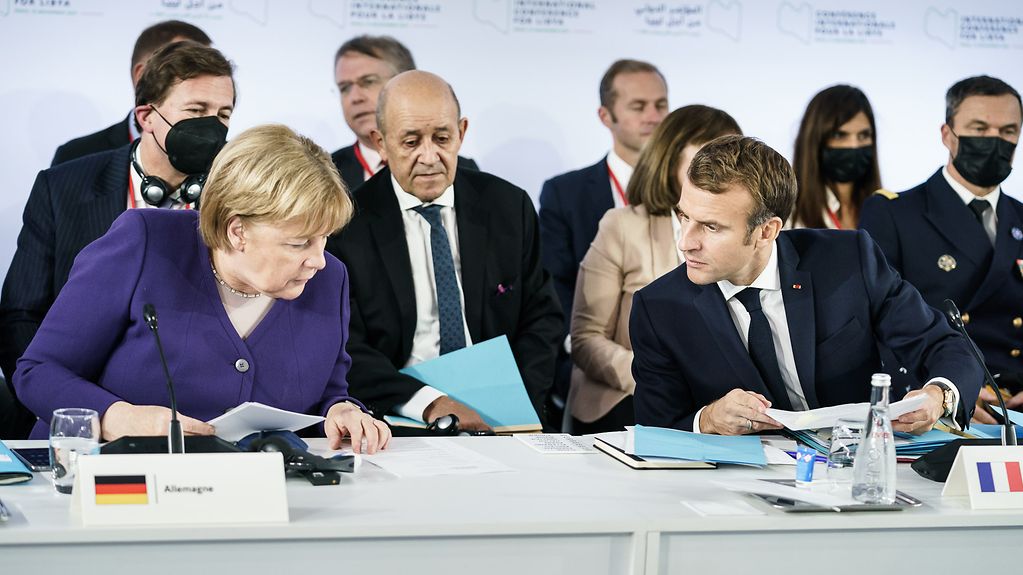Federal Chancellor Merkel at the Paris International Conference for Libya
Support for Libya on its way to achieving long-term stability – this was the focus of the Conference for Libya in Paris on Friday, as well as being the core goal of efforts by the international community. The Federal Chancellor stressed that it was important for the people of Libya to be able to decide on their own future in elections – and these must be accepted by all sides.
3 min reading time

In close dialogue for a peaceful future in Libya: Federal Chancellor Merkel and French President Macron.
Photo: Federal Government/Denzel
At the invitation of French President Emmanuel Macron, Federal Chancellor Angela Merkel travelled to Paris to co-chair the Conference for Libya – together with France, Italy and the United Nations as well as Libya itself. “A lot has happened since the Berlin Conference in January 2020,” said the Federal Chancellor after the conference. The common aim is clear: help Libya achieve lasting stability.
Reconciliation is a lengthy process
Reconciliation between the various powers in Libya would be a “lengthy process”, noted Merkel. She said the conference in Paris had once again shown clearly that “we care about what is happening in Libya,” adding that the international community was there to support the people of Libya.
Stability through elections
One of the central issues at the conference was the upcoming parliamentary and presidential elections. Together with the United Nations, the Federal Government is working to ensure that the elections will take place on 24 December this year, in accordance with the political roadmap adopted by the Libyan Political Dialogue Forum. According to the Federal Chancellor, the most important thing is for the people in Libya to be able to decide their own future again. “The elections on 24 December are absolutely crucial here, of course,” said Merkel.
“Not everyone can win – that is the nature of elections”
The Federal Chancellor said she hoped that preparations for the elections would be handled in such a way that the election results would be accepted afterwards. “Not everyone can win – that is the nature of elections,” said Merkel. In view of such a fragile process, she said, it was extremely important to agree beforehand that the vote of the Libyan people would subsequently be accepted. After all, there were three million registered voters already, she said, noting that this indicated how much Libyans themselves wanted the election process to work.
Peaceful future without foreign military
Another priority on the conference agenda was the withdrawal of foreign military forces – “not just on paper”, as the Federal Chancellor said. It was important for initial steps to be taken on the ground too, she added. The Federal Chancellor welcomed the fact that the first such steps had already been taken, “and these must be followed by many more, of course,” she said.
Fundamental progress achieved since first Berlin Conference on Libya
The conference in the French capital was preceded by two conferences on Libya in Berlin: the first took place in January 2020 at the level of heads of state and government and at the invitation of the Federal Chancellor, while the second was held in the summer of this year at the level of foreign ministers.
The situation in the country has improved markedly since the first Berlin Conference on Libya: in October 2020, the parties to the conflict in Libya agreed on a nationwide ceasefire. In addition, the transitional government under Prime Minister Dbeibeh assumed governmental responsibility in March this year and is currently preparing for the nationwide elections in December. What is more, the end of the oil blockade means that the population is now receiving much-needed support, while other parts of the economy are likewise beginning to move forward again.
The international community meets in Paris: the Paris International Conference for Libya was co-chaired by Germany, France, Italy, the United Nations and Libya. It brought together representatives of some 30 states, international organisations and institutions. On the Libyan side, the talks were attended by Prime Minister Dbeibeh and Presidency Council head al-Menfi.